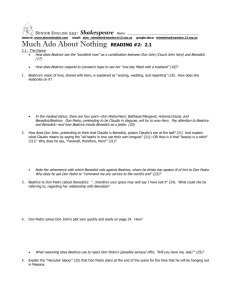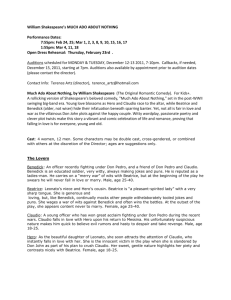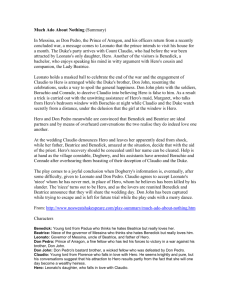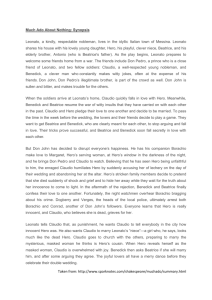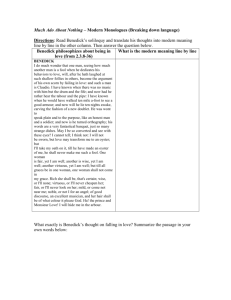Contents - Cambridge University Press
advertisement
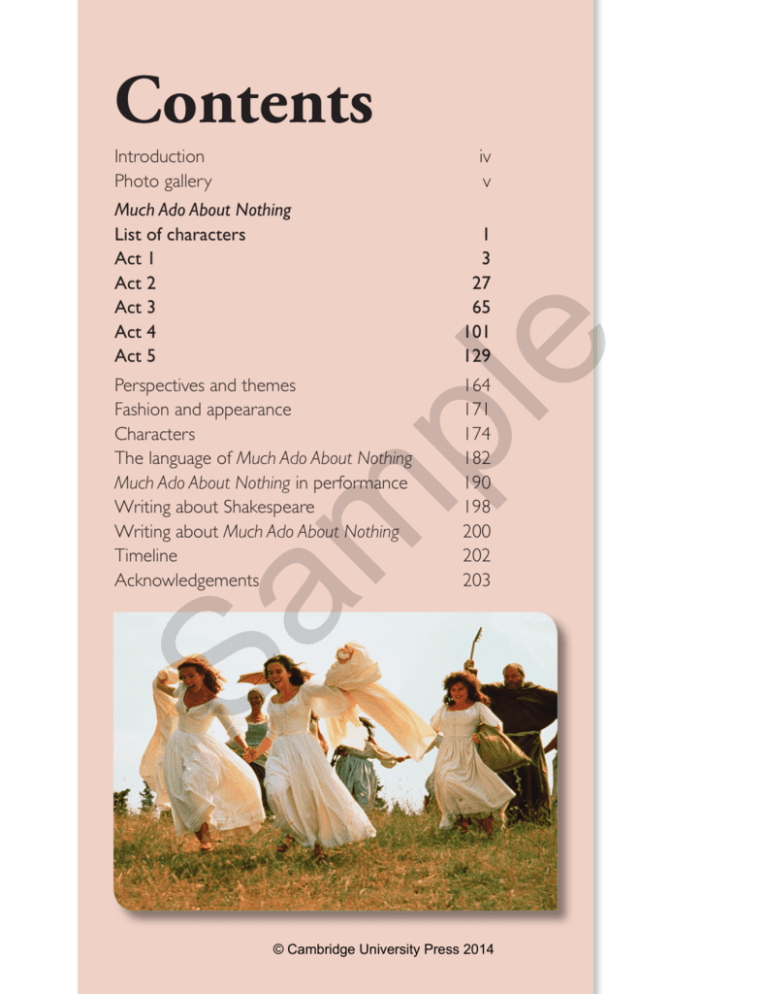
Contents iv v Much Ado About Nothing List of characters Act 1 Act 2 Act 3 Act 4 Act 5 1 3 27 65 101 129 pl e Introduction Photo gallery Sa m Perspectives and themes Fashion and appearance Characters The language of Much Ado About Nothing Much Ado About Nothing in performance Writing about Shakespeare Writing about Much Ado About Nothing Timeline Acknowledgements 164 171 174 182 190 198 200 202 203 © Cambridge University Press 2014 pl e ▲ Don John maliciously tricks Claudio and Don Pedro into believing they have seen Hero entertaining another man in her bedroom. At the wedding ceremony, Claudio publicly and savagely rejects Hero as a common whore. Sa m ▼ Faced with such accusations, Hero faints with shock. Beatrice believes her cousin to be innocent. She urges Benedick to challenge Claudio to single combat. On the Friar’s advice, Leonato orders that Hero be hidden and reported dead until her innocence is proved. x © Cambridge University Press 2014 Sa m pl e Fortunately, Don John’s plot is accidentally uncovered by the town’s incompetent Watchmen, led by Dogberry, their even more inept Master Constable. Still believing Hero is dead, a penitent Claudio agrees to marry Leonato’s niece, said to be the ‘image’ of Hero. She is, of course, Hero herself. When love sonnets in their own handwriting are produced, Beatrice and Benedick reluctantly admit their love for each other and also agree to marry. © Cambridge University Press 2014 xi ▲ A delighted Benedick kisses his bride-to-be, then leads the whole company in a celebratory dance. Not even news that Don John has been captured can spoil Sa m ▼ ‘Prince, thou art sad, get thee a wife, get thee a wife’. Productions often show Don Pedro (seated, left) alone at the end of the play, while couples dance happily around him. pl e his happiness. xii © Cambridge University Press 2014 Much Ado About Nothing List of characters Leonato’s Household governor of Messina his brother HERO Leonato’s only daughter BEATRICE an orphan, Leonato’s niece SIGNOR LEONATO SIGNOR ANTONIO MARGARET URSULA gentlewomen attending on Hero FRIAR FRANCIS pl e Musicians, Attendants, Maskers and Wedding Guests The Military Prince of Arragon his bastard brother COUNT CLAUDIO of Florence SIGNOR BENEDICK of Padua DON PEDRO DON JOHN BORACHIO followers of Don John Sa m CONRADE companions of Don Pedro MESSENGER a singer servant to Benedick BALTHASAR BOY The Town Constable of Messina Deputy Constable (or Headborough) DOGBERRY VERGES SEXTON GEORGE SEACOLE Senior Watchman WATCHMAN 1 WATCHMAN 2 Other Watchmen The play is set in Messina, Sicily © Cambridge University Press 2014 1 A Messenger brings a letter informing Governor Leonato that Don Pedro and his victorious army will shortly arrive in Messina. The Messenger reports that young Count Claudio has performed great deeds of bravery in the war. 1 Messina: a man’s world? (in groups of four to six) Stand in a circle and read through lines 1–118 with as much energy and enthusiasm as possible. Discuss clues in the characters’ speech and behaviour that suggest this play will focus on the position and role of women in a male-dominated world. Identify the words Leonato uses to describe Beatrice and Benedick’s ‘battle of the sexes’, and take turns to read them out. Stagecraft Sending the audience a ‘message’ Sa m pl e Stagecraft is the technical side of performance, such as the way stage designers approach a scene. In the 2002 Royal Shakespeare Company production (pictured below), the director and designer made the decision to begin the play with Beatrice entering the stage on a real Second World War-era motorbike. What sort of a ‘statement’ would this impressive theatrical moment have made about the character of Beatrice and the setting of that particular production? Suggest other ways in which the director and designer might use the technical opportunities of a modern theatre to create an impressive opening ‘spectacle’ for the audience. by this by now three leagues about nine miles gentlemen noblemen action battle sort high rank, nobility none of name no one well known achiever winner Florentine citizen of Florence equally remembered 2 © Cambridge University Press 2014 suitably rewarded borne himself performed in battle figure appearance bettered expectation surpassed all expectations badge show or sign kind natural weep at joy cry with happiness Much Ado About Nothing Act 1 Scene 1 Messina Leonato’s house Enter leonato, governor of Messina, hero his daughter and beatrice his niece, with a messenger I learn in this letter, that Don Pedro of Arragon comes this night to Messina. MESSENGER He is very near by this, he was not three leagues off when I left him. LEONATO How many gentlemen have you lost in this action? MESSENGER But few of any sort, and none of name. LEONATO A victory is twice itself, when the achiever brings home full numbers. I find here, that Don Pedro hath bestowed much honour on a young Florentine called Claudio. MESSENGER Much deserved on his part, and equally remembered by Don Pedro. He hath borne himself beyond the promise of his age, doing in the figure of a lamb the feats of a lion. He hath indeed better bettered expectation than you must expect of me to tell you how. LEONATO He hath an uncle here in Messina will be very much glad of it. MESSENGER I have already delivered him letters, and there appears much joy in him, even so much that joy could not show itself modest enough without a badge of bitterness. LEONATO Did he break out into tears? MESSENGER In great measure. LEONATO A kind overflow of kindness: there are no faces truer than those that are so washed. How much better is it to weep at joy, than to joy at weeping! Sa m pl e LEONATO © Cambridge University Press 2014 5 10 15 20 3 Beatrice questions the Messenger about Benedick, sarcastically calling him Signor Mountanto. Faced with a barrage of mocking comments about a fellow soldier, the Messenger politely attempts to defend Benedick’s reputation. Mountanto in fencing, an upward thrust; also a lewd reference to mounting (see Activity 2 opposite) Characters First impressions Beatrice’s lines in this scene mark her out as an intelligent and witty woman – quite a match for the Messenger, whom she teases and torments until Don Pedro arrives. Note how Beatrice’s insults and accusations shape the audience’s opinion of Benedick before he enters the scene. Why do you think that Shakespeare has done this? What does it add to Benedick’s eventual arrival? love, famed for his ability with a bow and arrow at the flight to an archery contest subscribed signed on behalf of birdbolt blunt-headed arrow tax criticise be meet get even musty victual stale food holp helped trencherman good eater stomach courage, appetite to pl e 1 On guard! (in fours) set … bills posted notices Cupid Roman god of desire and Sa m One of your group reads Beatrice’s part (lines 23–56), in which she mocks the Messenger and sets out to deliberately ‘mistake’ his meaning. The other three take the parts of the Messenger, Leonato and Hero. Beatrice should say the lines quickly and with great energy, perhaps even moving around the stage. Think about how the other characters could say their lines, and what physical and facial gestures they might use to defend themselves from her verbal blows. do something 2 What does Beatrice think of ‘Signor Mountanto’? ‘Mountanto’ (line 23) was a fencing term, which Beatrice uses here to imply that Benedick is a flashy swordsman. But is she talking about his skills in battle or about his ability to ‘conquer’ ladies? This is an early example of the double entendre (double meaning) that Beatrice uses for comic effect. Read through lines 23–70. Make a list of Benedick’s ‘failings’, as identified by Beatrice. Suggest why you think she might dislike him so much. ▼ This Beatrice was as sharp with a sword as she was with her tongue. wits parts of the mind halting limping wit intelligence 4 © Cambridge University Press 2014 next block latest hat shape (see p. 171) Much Ado About Nothing Act 1 Scene 1 I pray you, is Signor Mountanto returned from the wars or no? MESSENGER I know none of that name, lady, there was none such in the army of any sort. LEONATO What is he that you ask for, niece? HERO My cousin means Signor Benedick of Padua. MESSENGER O he’s returned, and as pleasant as ever he was. BEATRICE He set up his bills here in Messina, and challenged Cupid at the flight: and my uncle’s fool, reading the challenge, subscribed for Cupid, and challenged him at the birdbolt. I pray you, how many hath he killed and eaten in these wars? But how many hath he killed? – for indeed I promised to eat all of his killing. LEONATO Faith, niece, you tax Signor Benedick too much, but he’ll be meet with you, I doubt it not. MESSENGER He hath done good service, lady, in these wars. BEATRICE You had musty victual, and he hath holp to eat it: he is a very valiant trencherman, he hath an excellent stomach. MESSENGER And a good soldier too, lady. BEATRICE And a good soldier to a lady, but what is he to a lord? MESSENGER A lord to a lord, a man to a man, stuffed with all honourable virtues. BEATRICE It is so indeed, he is no less than a stuffed man, but for the stuffing – well, we are all mortal. LEONATO You must not, sir, mistake my niece: there is a kind of merry war betwixt Signor Benedick and her: they never meet but there’s a skirmish of wit between them. BEATRICE Alas, he gets nothing by that. In our last conflict, four of his five wits went halting off, and now is the whole man governed with one: so that if he have wit enough to keep himself warm, let him bear it for a difference between himself and his horse, for it is all the wealth that he hath left to be known a reasonable creature. Who is his companion now? He hath every month a new sworn brother. MESSENGER Is’t possible? BEATRICE Very easily possible: he wears his faith but as the fashion of his hat, it ever changes with the next block. Sa m pl e BEATRICE © Cambridge University Press 2014 25 30 35 40 45 50 55 5 As Beatrice continues to speak mockingly of Benedick to the Messenger, the prince, Don Pedro, and his followers arrive. Leonato eloquently welcomes his royal guest and Beatrice begins her taunting of Benedick. 1 The warriors return (in large groups) Stage your own performance of lines 70–88, where Leonato welcomes the prince and his comrades in arms. Act out the scene in two different ways: • A highly organised, hierarchical and formal greeting, as shown in the image below. The characters (except for the hiding Beatrice!) line up neatly and according to rank. • A relaxed and good-humoured greeting, where the characters behave warmly towards each other. Some directors make the staging less formal by, for example, having Don Pedro hug Leonato (‘You embrace your charge too willingly’, line 76). pestilence plague taker one who catches it presently immediately noble honourable caught the Benedict caught madness pl e a Why did you position the different characters where you did in each performance? To what extent do you think the dialogue encourages physical interaction between the actors? Discuss these points in your group. your books your good books and he were if he were study library squarer brawler, hooligan b Decide which of the two interpretations above you think is the most appropriate and dramatically interesting, and write a paragraph outlining how you would like to stage this scene. ere a be before he is JOHN the bastard Don John is an illegitimate child (his parents were not married) Sa m ▼ Benedick is centre left, in the black coat with white collar. Beatrice stands entirely hidden, except for part of her face, behind the characters on the other side of the stage. Why has the director placed her there? sorrow abides sadness remains charge trouble, expense have it full are well answered fathers herself looks like her father marks takes any notice of Lady Disdain contemptuous lady 6 © Cambridge University Press 2014 Much Ado About Nothing Act 1 Scene 1 I see, lady, the gentleman is not in your books. BEATRICE No, and he were, I would burn my study. But I pray you, who is his companion? Is there no young squarer now, that will make a voyage with him to the devil? MESSENGER He is most in the company of the right noble Claudio. BEATRICE O Lord, he will hang upon him like a disease: he is sooner caught than the pestilence, and the taker runs presently mad. God help the noble Claudio, if he hath caught the Benedict. It will cost him a thousand pound ere a be cured. MESSENGER I will hold friends with you, lady. BEATRICE Do, good friend. LEONATO You will never run mad, niece. BEATRICE No, not till a hot January. MESSENGER Don Pedro is approached. pl e MESSENGER 60 65 70 Enter don pedro, claudio, benedick, balthasar and john the bastard Good Signor Leonato, are you come to meet your trouble? The fashion of the world is to avoid cost, and you encounter it. LEONATO Never came trouble to my house in the likeness of your grace: for trouble being gone, comfort should remain: but when you depart from me, sorrow abides, and happiness takes his leave. DON PEDRO You embrace your charge too willingly. I think this is your daughter? LEONATO Her mother hath many times told me so. BENEDICK Were you in doubt, sir, that you asked her? LEONATO Signor Benedick, no, for then were you a child. DON PEDRO You have it full, Benedick: we may guess by this, what you are, being a man. Truly, the lady fathers herself: be happy, lady, for you are like an honourable father. BENEDICK If Signor Leonato be her father, she would not have his head on her shoulders for all Messina, as like him as she is. BEATRICE I wonder that you will still be talking, Signor Benedick, nobody marks you. BENEDICK What, my dear Lady Disdain! Are you yet living? Sa m DON PEDRO © Cambridge University Press 2014 75 80 85 7
